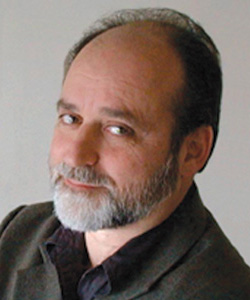
Attorneys are in a great position to advise their clients about innovative solutions, says business strategist John Di Frances.
May 2, 2012 – With a worldly business perspective and an insider’s interest in Wisconsin’s economy, John Di Frances has some ideas about improving the state’s business environment, and lawyers play a crucial role, he says.
Di Frances, an international businessman and speaker who lives in Wisconsin, says Wisconsin’s business growth is continually falling behind, in large part because young, college-educated workers and young professionals are leaving the state for better work environments.
“We have a pretty closed, old-school mindset here,” said Di Frances, who lives in Genesee. “But if we want to keep our kids here, we must create the work environments they want. There are some businesses that are receptive to this, but in general, we are far behind.”
In addition, the daily grind often prevents business leaders from thinking outside the box, he says. In a global economy, such thinking is crucial to create new opportunities for growth.
Di Frances, founder of Red Door Innovation® located in Wales, says “innovation” is the key to business growth in the 21st century, but many business leaders are unwilling or unable to devote the time, resources, and leadership necessary to implement creative ideas.
“It seems like people want to talk about innovation here, but not act upon it,” Di Frances said. “But Wisconsin’s business communities won’t survive and thrive without it.”
That’s where lawyers come in.
Di Frances says Wisconsin’s business and government leaders must be bigger innovators. A keynote speaker at the State Bar of Wisconsin PINNACLE™ Real Estate and Business Institute, June 14-15, Di Frances says lawyers are major players in brokering that innovation process.
In his presentation, “The Power of Free Markets and the Future of Wisconsin’s Business Environment,” Di Frances will discuss Wisconsin’s business climate, those factors that impede business development, and the role of attorneys in achieving innovative business solutions.
“Attorneys, who often serve as advisors to corporate executives, are in a great position to advise their clients about effective ways to address innovation in the new business environment,” he said. “Solutions must be capable of implementation. Lawyers can facilitate their clients' move toward innovation.”
“Lawyers are the dealmakers,” Di Frances says. “Big ideas don’t work without cooperation between business, government, and community leaders. Lawyers can connect the right people to make big things happen.”

Not all practitioners are aware that email communications can form, modify or amend contracts, says Milwaukee attorney Hal Karas.
Oops, I didn’t know that email could actually create a contract!
Did you know that email and other digital communications can actually create, modify, or amend a contract between parties – even contracts requiring satisfaction of the statute of frauds? According to Hal Karas, a commercial real estate lawyer, many lawyers don’t.
Karas says email is considered to be a form of writing sufficient to form a contract, meaning lawyers should advise clients to be careful before hitting that “send” button. In some cases, email exchanges can be given legal effect as a formal offer, acceptance, or modification.
But as this area of contract law evolves, Karas says many lawyers may not know the implications of email communications on contract formation, let alone their clients.
“I will sometimes see an offer and an acceptance by email,” he said. “Our statutes are pretty clear that email, without a handwritten signature, is enough to form a contract. The email exchanges themselves are enough. It’s something that not all practitioners are aware of.”
In a presentation at the Real Estate and Business Institute, Karas and Rebecca Bradley of Whyte Hirschboeck Dudek S.C., Milwaukee, will discuss the law behind email contracting and the practical implications for lawyers and their clients.
They’ll discuss how far-reaching the law goes. For instance, can lawyers have clients sign engagement letters, acknowledging the terms of the lawyer’s representation, by email?
The co-presenters will also discuss the use of electronic means to record documents. For instance, many Wisconsin counties accept electronic recording of real estate documents.
Alternatives of foreclosure
Currently, about 500 foreclosures are filed in Milwaukee Country each month (6,000 per year), according to Debra Tuttle, a lawyer for the Metro Milwaukee Foreclosure Mediation Program.
Milwaukee County accounts for about one-quarter of the state’s foreclosure filings, meaning approximately 24,000 foreclosures are filed statewide at current levels.
Tuttle says each foreclosure costs the state, the community, and homeowners about $40,000 for diminished property value, vandalism, and other ancillary costs. At that rate, open foreclosures could cost these stakeholders about $960 million per year.
What’s the lesson here? Exploring alternatives to foreclosure is worthwhile, not just for the simple fact that foreclosure results in loss of home ownership. But the process is complicated and can be overwhelming for the homeowners who must initiate it, Tuttle says.
“It’s so important to avoid those foreclosures that are preventable, and many of them are,” Tuttle said. “It’s just that people don’t know that there are other options, or they don’t know who to contact and in some cases end up paying money to scammers.”
Tuttle says the other difficulty is that information about foreclosure alternatives is piecemeal. There’s really not one place to get it, and state law doesn’t necessarily cover it.
“Because of our daily experience in helping homeowners get modifications, we have been able to acquire all this information,” Tuttle said. “What we can do is explain how the programs work, and point lawyers to the best sources of information to help their clients.”
Information is exactly what Tuttle and co-presenter Amy Koltz, also of the Metro Milwaukee Foreclosure Mediation Program, will deliver in “Alternatives to Foreclosure” at the State Bar of Wisconsin PINNACLE’s Real Estate and Business Institute, June 14-15.
In other institute breakout sessions on foreclosure, other presenters will discuss new developments in foreclosure defense, and how foreclosure impacts credit ratings.
Institute information and speakers
The State Bar of Wisconsin PINNACLE’s Real Estate and Business Institute is a two-day event, June 14-15, at the Chula Vista Resort in Wisconsin Dells. Speakers and presenters – most of them Wisconsin lawyers practicing in real estate and business law – will help other lawyers gain knowledge in these areas while earning up to 14.5 CLE credits, 4.0 EPR credit.
For a full list of schedule speakers, topics, and events, visit the Institute’s webpage. Early-bird registration ends May 4, so don’t wait to register! Click here to register, or call the State Bar at (800) 728-7788 or (608) 257-3838.
Other upcoming Institutes
What are institutes?
In 2011, State Bar of Wisconsin PINNACLE began producing several multi-day Continuing Legal Education (CLE) institutes. The institutes, which replaced the annual convention format, enrich the learning and networking opportunities of attorneys in the same or related practice areas by delivering more in-depth programming to members in designated practice areas.
